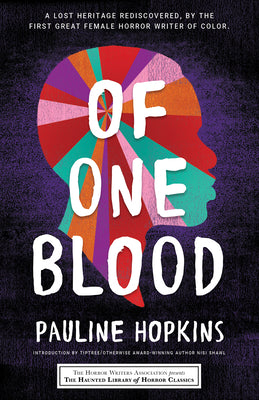This title is currently out of stock. Leave us your email address, we’d let you know when it’s in stock again!
-

A note on book covers: while we do our best to ensure the accuracy of cover images, ISBNs may at times be reused for different editions of the same title which may hence appear as a different cover.
Of One Blood: Or, The Hidden Self
Of One Blood: Or, The Hidden Self
Couldn't load pickup availability
• with introduction to the book by Nisi Shawl
• with biography, reading list, and discussion questions by series editor and author Eric J. Guignard
• with annotations by series editor and author Leslie S. Klinger
Of One Blood is the last of four novels written by groundbreaking Black author Pauline Hopkins. She is considered by some to be "the most prolific African-American woman writer and the most influential literary editor of the first decade of the twentieth century." Of One Blood first appeared in serial form in Colored American Magazine in the November and December 1902 and the January 1903 issues of the publication.
Hopkins tells the story of Reuel Briggs, a medical student who has no interest in his Black heritage nor appreciative of African history, but finds himself in Ethiopia on an archaeological trip. His motive is to raid the country of lost treasures -- which he does find in the ancient land. However, he discovers much more than he bargained for: the painful truth about blood, race, and the half of his history that was never told.
Hopkins wrote the novel intending, in her own words, to "raise the stigma of degradation from [the Black] race." The title, Of One Blood, refers to the biological kinship of all human beings.
Details of Book
Related Collections:
A note on book covers: while we do our best to ensure the accuracy of cover images, ISBNs may at times be reused for different editions of the same title which may hence appear as a different cover.

-
One Line Summary
Explores race, identity, and heritage through compelling storytelling.
-
Who is this book for?
If you're interested in stories that explore deep themes of race and history, this book is a compelling choice. Pauline Hopkins's storytelling brings to light important conversations about identity, heritage, and the shared human experience, all woven into a captivating narrative set in Ethiopia. It's a thought-provoking read that offers both historical insight and literary richness.

